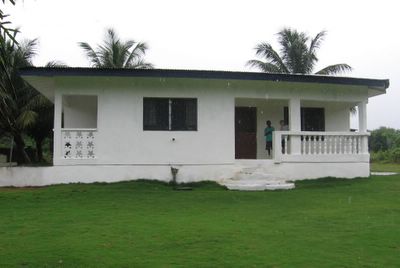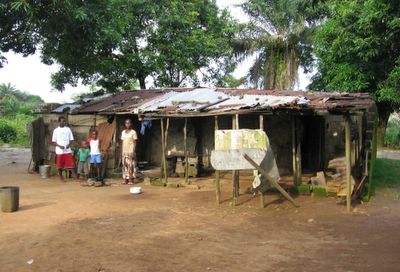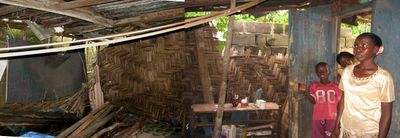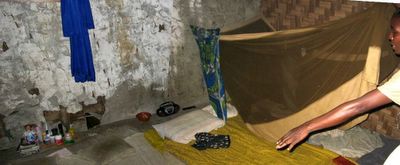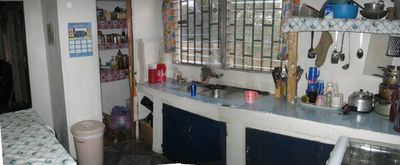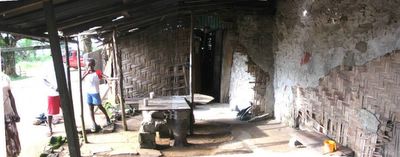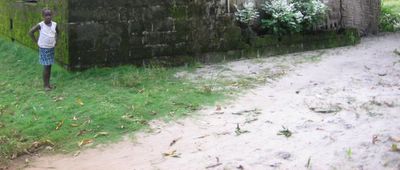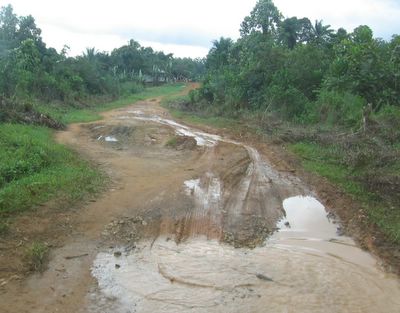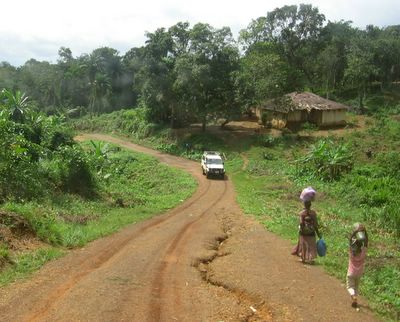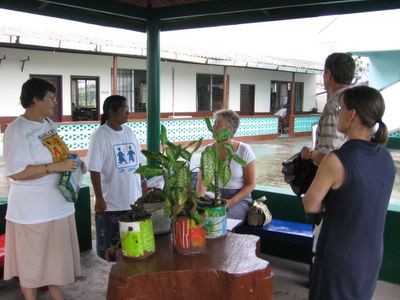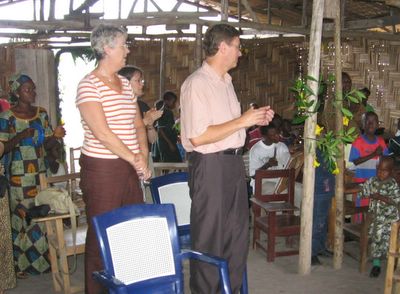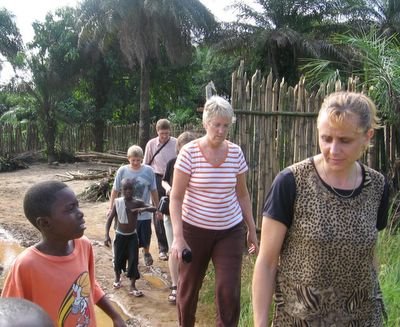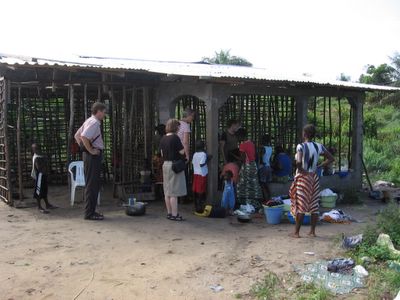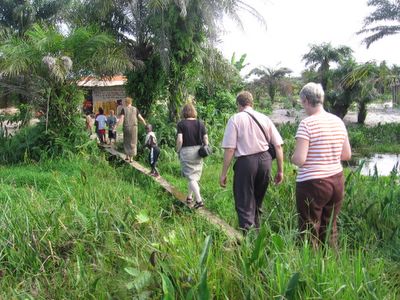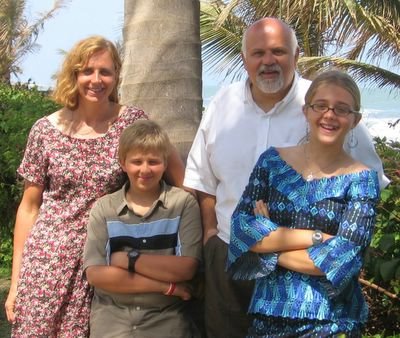Tuesday, July 25, 2006
One Year After
As we pass our one year anniversary being here, it is a good time for an update. We are witnessing a nation turning a corner, and we have turned one ourselves. We have seen free and fair elections in a war ravaged land, the first elected female national leader in African history, theft and violent death in our neighborhood, dysentery, malaria, and adjustment to a completely different climate and culture. We now eat torpagee, collard greens, cassava leaf, palm butter, eggplant, potato greens, pumpkin soup, peanut soup, and cabbage as regular entrees on a menu that sees rice or bulgur wheat and lots of pepper every day. We have adjusted to lizards, thumb-sized cockroaches and palm spanning spiders living with us, coal pots, hauling water from a well each day, flushing toilets with a bucket, never feeling very clean, limited electricity in the day, none after bedtime, no TV, and having to travel a half hour for unreliable internet access. We accept as a matter of course that here, if it breaks you don’t “get a new one,” you fix it or live without, and here the climate and country breaks everything faster, from fuel pumps to high tech inverters to mufflers to dishes to shoes.
We live in and among some of the poorest people in the world, who survive day to day on whatever they can find or eek out, who have lived through fifteen years of war, displacement and have seen terror and death close up, who fight hunger and disease, and who still say without hesitation that “God is good all the time.” We have seen two of our neighbors, a husband and a wife, die of different unnamed illnesses three weeks apart, leaving behind four orphans. We have seen another kill three intruders with an AK-47 who were attempting to break in to his home and hurt his family.
On July 24, we celebrated our year anniversary with me being arrested briefly for accidentally driving into a Presidential convoy, the car’s electrical system giving out, my computer screen beginning to fail and Dell telling me I need to take it to the US to get it fixed. But that day we also celebrated LEAD’s second class graduating, me preparing for some exciting training I’ll be doing for about 25 Liberian psychosocial workers, still so thankful for a succesful visit from Calvin and Kuyper Colleges, looking forward for a trip with the family to Mali later in August for the CRWRC West Africa Ministry Team meeting, and eating real chocolate cake baked by Hannah in our new propane stove.
So a year later Liberia is still Liberia, but a little more stable, a little less corrupt. The roads are a little better. Electricity is returning "small small." The rogues are still active, but losing as much as they are winning. Our neighbors are still heroically making life work day to day in the most challenging circumstances. The Reeds in Liberia are stronger, by far, and more adjusted to the “fix it or live without” way of life here. And you are still here—reading this, supporting us, supporting Liberia, and letting us know our journey is shared. We hope our picture of Liberia thus far has been fair and accurate, and we hope this second year will see us all still dancing with the One What Brung Us.
Monday, July 17, 2006
Let's Play "Our Home, Vera's Home"
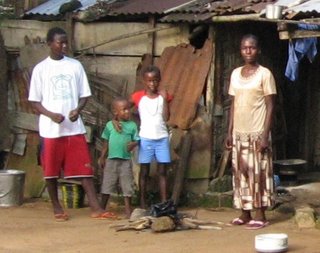
I’d like to tell you about Vera Brown. Vera has lived in our neighbor- hood since the civil wars began, about sixteen years ago. She is not married, late thirties, and has four children, Moriah, Trokon, Gift, and Prince. The children’s fathers are completely out of the picture. We met Vera through Trokon, her 17 year old son, who we had known as a helpful serious teenager. Trokon one day approached us to help him get back to school after being unable to attend for three years. We agreed to pay his tuition for this coming year, and in exchange, he does yard work for us every week. (In addition, Renita tutors him several times a week to get him ready for school-- He will be entering sixth grade.) In gratitude, Vera visited us and after a time we became impressed by her humility, her strength, her perseverance—and her poverty.
For some time before we knew her, she and her children lived on the $20.00 a month she made teaching nursery school to sixty community children. Through a variety of ordained circumstances, we came to ask her if she would like to work with us (and in the process quadruple her salary.) She said yes, and now is part of our world five days a week. She washes our clothes, shops and cooks Liberian dinners for us Monday through Friday, and helps with some light cleaning. A couple weeks ago, I asked her if I could share her story and pictures of her home life with you. She said, “Yes, Unca Bob.”
You know, I tend to complain a bit about our house. At around a thousand square feet, it would pass as a “handyman’s special” summer cottage in Michigan. One toilet does not work; there is limited electricity and no running water. The floor is covered with plastic sheets and it is always dirty. Most Americans I know tell us we are making a big sacrifice to live here. Whenever I find myself whining more than usual, I pull out my Dell laptop computer, look at the pictures I took of her life, and play a little exercise called “Our Home, Vera’s Home.”
Here’s how it goes:
ReedNews Update
As life returns to Liberian normal, I have some time to take a breath and look at my immediate surroundings.
Item: Deacon Reeves, who is our dear neighbor next door, has been diagnosed with type II diabetes. He now is taking insulin every day and still his blood sugar count is over 300 (It’s supposed to be under 126). He was in the hospital for a week, and he does not look so good. Every morning I help him check his blood and am learning to help with his injections.
Item: The huge international NGO Save the Children is in our community, organizing youth activities. Looks like it could be a good thing. They helped the kids with an election of leaders and Hannah was elected treasurer by acclamation. I was surprised, because there were about a hundred kids and it seemed like most knew Hannah and wanted to see her in leadership. I’m sure I was beaming a bit with fatherly pride.
Item: The rainy season is on us full throttle. In the last 48 hours, it has rained about 40, with probably ten inches of rain falling. Intense rain like this effects activities like heavy snow does in Michigan—events are canceled, people stay home, and we all wait for the water to go away. Huge puddles/ponds are everywhere.
Item: Renita is being asked to speak more. Last week it was a workshop on leadership for this community, and Sunday she was the guest speaker at a school graduation.
Item: The rainy season brings more than rain—the noisy patter on the zinc roofs makes a perfect cover for rogues. Sunday night they tried scaling our glass shard covered nine foot wall. They got some of our next door neighbor’s clothes off the line and draped them over the wall where the small gate makes it easier to climb. We heard them and they never got in. Today, we install our remaining solar motion detector light at the small gate and throw up razor wire over the top. I hate razor wire, but as the rogues go, so go the counter measures.
Item: Deacon Reeves, who is our dear neighbor next door, has been diagnosed with type II diabetes. He now is taking insulin every day and still his blood sugar count is over 300 (It’s supposed to be under 126). He was in the hospital for a week, and he does not look so good. Every morning I help him check his blood and am learning to help with his injections.
Item: The huge international NGO Save the Children is in our community, organizing youth activities. Looks like it could be a good thing. They helped the kids with an election of leaders and Hannah was elected treasurer by acclamation. I was surprised, because there were about a hundred kids and it seemed like most knew Hannah and wanted to see her in leadership. I’m sure I was beaming a bit with fatherly pride.
Item: The rainy season is on us full throttle. In the last 48 hours, it has rained about 40, with probably ten inches of rain falling. Intense rain like this effects activities like heavy snow does in Michigan—events are canceled, people stay home, and we all wait for the water to go away. Huge puddles/ponds are everywhere.
Item: Renita is being asked to speak more. Last week it was a workshop on leadership for this community, and Sunday she was the guest speaker at a school graduation.
Item: The rainy season brings more than rain—the noisy patter on the zinc roofs makes a perfect cover for rogues. Sunday night they tried scaling our glass shard covered nine foot wall. They got some of our next door neighbor’s clothes off the line and draped them over the wall where the small gate makes it easier to climb. We heard them and they never got in. Today, we install our remaining solar motion detector light at the small gate and throw up razor wire over the top. I hate razor wire, but as the rogues go, so go the counter measures.
Friday, July 14, 2006
A Trip to the Up Country, then Wrap up and Goodbyes
By the time you get this, the visit is memory, but what a lovely memory it remains for those of us who hosted the delegation from Calvin and Kuyper Colleges. In four and a half days, we met with the staff of Mother Patern College over its proposed BSW curriculum, visited government and large agency chiefs, toured two communities-- one sub-urban and one in the interior, visited agricultural and women's empowerment programs (one in the same, it turns out), tasted Liberian food and night-life, and saw about as much of Liberia as one can see in the amount of time available.
The purpose of this visit was to introduce Liberia to a team of higher education professionals who are interested in how they might serve the country as it rebuilds. I think it went about as well as possible, and now the three colleges move on to figure out next steps. Will keep you informed.
Below is our Tuesday trip to one of Mother Patern's women's development programs. MPCHS works with trauma and gender-based violence survivors all over the country. At the Koons Town site, the women engage in a number of individual microbusiness projects, but all the women are involved in cassava farming. In addition, there are workshops on trauma healing and community peacebuilding. A few weeks ago, Renita was here conducting some personal and microbusiness budget classes.
The purpose of this visit was to introduce Liberia to a team of higher education professionals who are interested in how they might serve the country as it rebuilds. I think it went about as well as possible, and now the three colleges move on to figure out next steps. Will keep you informed.
Below is our Tuesday trip to one of Mother Patern's women's development programs. MPCHS works with trauma and gender-based violence survivors all over the country. At the Koons Town site, the women engage in a number of individual microbusiness projects, but all the women are involved in cassava farming. In addition, there are workshops on trauma healing and community peacebuilding. A few weeks ago, Renita was here conducting some personal and microbusiness budget classes.
Wednesday, July 12, 2006
Visiting MOH, MOE, USAID
Er, that's Ministy of Health, Ministry of Education, and the United States Agency for International Development, in case you didn't know. The Calvin/Kuyper guests are leaving Wednesday, and I'm still on our Monday activities. But its been a great delight to have Cheryl Brandsen, Beryl Hugan and Judi Meerman here with us.
Monday we visited Dr. Walter Gwenigali, Minister of Health, then Dr. Joseph Korto, Minister of education, then Dr. Wilbur Thomas, Mission Director USAID/Liberia. The meetings were encouraging, exciting, and we came away feeling like Liberia and the US government would welcome this budding partnership between these three colleges. The establishment of a Bachelor of Social Work program would be a first in Liberia and would be an important step in this country's healing process.
Tuesday we visited a village in the interior. Another overwhelmingly positive and uplifting experience for our academic guests. Images soon.
Monday we visited Dr. Walter Gwenigali, Minister of Health, then Dr. Joseph Korto, Minister of education, then Dr. Wilbur Thomas, Mission Director USAID/Liberia. The meetings were encouraging, exciting, and we came away feeling like Liberia and the US government would welcome this budding partnership between these three colleges. The establishment of a Bachelor of Social Work program would be a first in Liberia and would be an important step in this country's healing process.
Tuesday we visited a village in the interior. Another overwhelmingly positive and uplifting experience for our academic guests. Images soon.
Monday, July 10, 2006
John Calvin and Abraham Kuyper, Meet Mother Patern
The college faculty from Calvin and Kuyper Colleges are here, and we are busy. Visiting Ministers, heads of big organizations, and Liberians in our neigborhood. Its too crazy to write much today. We'll give you the summary by weeks end. More pics tomorrow, I hope.
Wednesday, July 05, 2006
Another Thing About Humidity
This humidity phenomenon is amazing. Two weeks ago, it wrecked our inverter-- the machine that turns DC power from our solar batteries to AC power for most of our wiring. The way humidity kills electronics is as follows: The Liberian air is saturated with water from the Atlantic. Dust in the air is salty from the same source. At night, the air cools just a few degrees, but if it hits the dew point, tiny drops of moisture condenses on the interior of electronic components. Combined with minute amounts of salty dust, the goo creates new electrical conduits and the entire system gets shorted out. And one expensive peace of equipment is toast. We now store most of our electronic intruments in huge Ziploc bags (donated by friend Mary Vermeer) filled with desiccant.
However, it is too late for the inverter. So, we are limping a bit, with only DC power in the day, running a couple DC lights and a DC adapter for out laptops and battery charger, and AC power throughout the house for just three hours in the evening, supplied by our trusty generator-- the VV 9500. (Named for the Van Valkenburg family, who donated it.) We still have it good compared to 90% of our neighbors, most who live without power on candle light every night.
However, it is too late for the inverter. So, we are limping a bit, with only DC power in the day, running a couple DC lights and a DC adapter for out laptops and battery charger, and AC power throughout the house for just three hours in the evening, supplied by our trusty generator-- the VV 9500. (Named for the Van Valkenburg family, who donated it.) We still have it good compared to 90% of our neighbors, most who live without power on candle light every night.
Tuesday, July 04, 2006
Awaiting the Pros from Dover
Well, actually, Grand Rapids. On Friday the 7th, faculty from Calvin College and Kuyper College with be here for five days to work with the Mother Patern College on its proposed Bachelor of Social Work program. While here, they with meet with Liberia's Minister of Health, the Minister of Education, the head of USAID/Liberia, visit some students and head up into the interior to see some of the work close up. Those of you who know me know how lousy I am at being a host, but I'm getting ready. Keep your eyes peeled-- I'll pass along updates as soon as I can. Hopefully, you will be able follow us in our work.
Subscribe to:
Posts (Atom)

